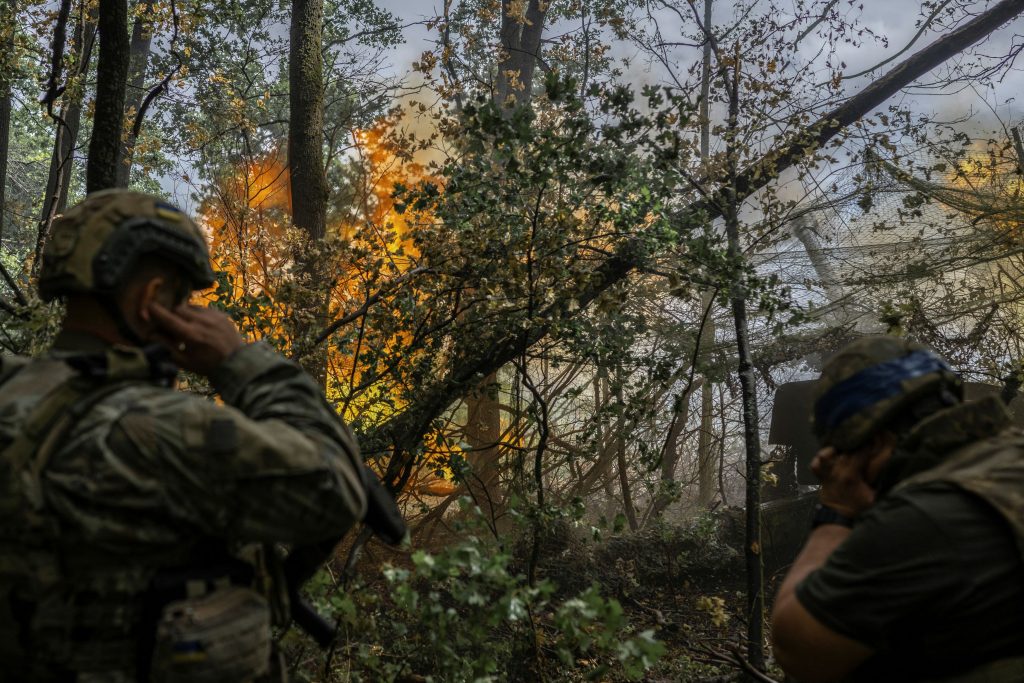KHARKIV, Ukraine—As Russia’s invasion of Ukraine enters a third summer, the 700-mile front line is the site of a bloody chess match, with each side moving pieces around in search of an advantage without conceding ground elsewhere.
Ukraine’s army, which recently blunted a dangerous Russian offensive that ran short on troops, is counterattacking in villages on its northeastern border.
Meanwhile, 200 miles to the southeast, Russian forces are squeezing toward a crucial supply road that helps sustain Ukraine’s defense of besieged cities in that area.
The war here is settling in for a brutal season during which thousands will likely die on both sides but neither appears poised to muster a decisive breakthrough.
For Ukraine, after last summer’s failed counteroffensive , the task for now is to use fresh Western weapons to hold on to positions.
Russia appears likely to continue its grinding approach, sacrificing large numbers of troops for small gains, said a senior Ukrainian security official.
“They don’t have enough troops” for a major advance in Kharkiv, the official said. “Moving troops there would make other parts of the front weaker.”
Long-range strikes
With the front line largely static, both sides are trying to use deep strikes to gain an advantage ahead of winter. Russia has targeted power stations and other infrastructure using missiles and explosive drones, knocking out half of Ukraine’s power-generation capacity and causing rolling blackouts in many cities. Russia has pummeled Ukrainian defensive positions with glide bombs launched from warplanes, and in June dropped a 3-ton version for the first time.
Ukraine, meanwhile, is using long-range missiles provided by the U.S. and its allies in an effort to cut off Crimea , the southern peninsula that Russia seized in 2014 and remains a weak spot given its geographical isolation from the Russian mainland.
“While Russia still makes some incremental battlefield gains, the sense is that the Ukrainians have been pretty strategic in some of their strikes and movements, and are holding their own,” said a senior U.S. Defense Department official.

Artillerymen of the 13th Operative Purpose Brigade ‘Khartiia’ of the National Guard of Ukraine fire a howitzer towards Russian troops, amid Russia’s attack on Ukraine, near the village of Lyptsi in Kharkiv region, Ukraine June 17, 2024. REUTERS/Viacheslav Ratynskyi
Russia’s thrust across the border into the Kharkiv region , launched at the end of May, appears to have caught Ukrainian forces off guard. Russian troops, advancing in two directions, quickly seized a few villages and the northern part of the city of Vovchansk.
Ukraine rushed in reinforcements and soon halted the Russians’ progress. Russia said it was seeking to create a buffer zone. After the Biden administration allowed Ukraine to use U.S.-supplied weapons to target enemy positions inside Russia that Moscow was using to launch attacks, the buffer zone’s value to Russia declined, said a senior Western intelligence official.
Ukrainian officials and military analysts say Russia also wanted to pull Ukrainian units from elsewhere on its defensive line and to bring Kharkiv, Ukraine’s second city, into range of Russia’s artillery guns. Now, after Ukrainian defenders halted the Russian advances, they are struggling to field enough troops to advance further.
The drones of ‘Yasni Ochi’
A Ukrainian reconnaissance drone streamed footage of a Russian dugout on the edge of the village of Starytsya to the northeast of Kharkiv one recent morning. At a house in a nearby village, a dispatcher concluded after three visits that the Russians had abandoned the position. Ukrainian units in the area are seeking to clear the Russians out, while the invaders are seeking to dig in using excavators.
Drone teams here like one dubbed “Yasni Ochi,” or Clear Eyes, have employed drones—from small explosive craft the size of a dinner plate to larger vehicles that can carry bombs weighing several pounds—to hit Russian positions with precision.
Yasni Ochi had been in the east, but was sent northward to the Kharkiv region recently to reinforce defenses. The team has quickly set up a system to observe and strike Russian infantry and vehicles.
In a typical strike in June, a drone team dropped a bomb on a house with a half-dozen Russians inside, causing the ammunition stored there to explode and killing the troops.
“We are holding well,” said Heorhiy Volkov, the unit’s commander. “Our system holds it.”
Some Ukrainian soldiers and opposition politicians had complained that defensive lines in the area were poorly constructed or nonexistent before Russia’s incursion, but the attack appears to have sped up preparations.
Northeast of Kharkiv, close to Russia, a Wall Street Journal team saw soldiers placing antitank mines into shallow holes in fields, part of at least two lines of trenches, dugouts and antitank traps apparently nearing completion.
Reinforced Ukrainian defenses with infantry trenches protected by explosive drone teams, and artillery guns soon to be boosted by additional ammunition approved by the U.S., are sapping Russian strength.
Russian forces inch forward
Russia has been able to replace its losses through recruitment, according to the officials, but the heavy attrition has made any advances plodding and predictable.
Still, Russians are edging forward in the eastern Donetsk region, which Russian President Vladimir Putin has given priority to and claimed as part of his country.
Russian forces in June infiltrated the eastern edge of the city of Chasiv Yar , a high point in the area, after earlier taking it then being flushed out. They are pushing northwest from the city of Avdiivka , Moscow’s only major conquest this year, toward a road that supplies Chasiv Yar.
The gains are devouring resources. Moscow suffered roughly 1,500 casualties on a single day, May 14, which was Russia’s worst day since the start of the war, according to a Western assessment of Ukrainian and other intelligence.
“Russia’s gains have come at a pretty grisly cost,” said the Western intelligence official.
Whether Russia will attempt a large-scale assault during the summer remains a vexing question for Ukrainian strategists and their Western advisers. Kyiv has quite good intelligence about the battlefield situation and can spot Russian forces massing for a potential attack, said the intelligence official.
“Taking strategic intent from that can be quite difficult,” the official said, noting that Russia has launched attacks throughout the war that standard military doctrine wouldn’t foresee.
Ukraine has been able to generate enough forces to replace losses and some reserves, the security official said, but would need several times more to launch any kind of major offensive.
Ukraine targets Crimea
With little prospect of achieving much more than holding the front line in the coming months, Ukraine is targeting Crimea with long-range missiles provided by the U.S.
The U.S. has barred Kyiv from using the longer-range ATACMS , which stands for the Army Tactical Missile System, on Russian territory, but Crimea is recognized by most countries as Ukraine’s, making it fair game.
Ukraine has in recent weeks destroyed launchers and radars of several advanced air-defense systems and two Russian ferries that transport military hardware. The rail-and-road bridge from Russia to Crimea, the main link to the peninsula, hasn’t been used for nearly a year for heavy military equipment since Ukraine severely damaged it with two explosive naval drones , according to Ukrainian officials.
Russian officials said five people on a beach were killed last week by shrapnel from ATACMS. The Kremlin blamed the U.S. and threatened unspecified consequences. Open-source intelligence analysts said debris appeared to be from Russian interceptors and not U.S. weapons.
Mykhailo Podolyak , a Ukrainian presidential adviser, said Crimea was “a large military camp and warehouse, with hundreds of direct military targets,” making attacks there legitimate.
Write to James Marson at james.marson@wsj.com and Daniel Michaels at Dan.Michaels@wsj.com


